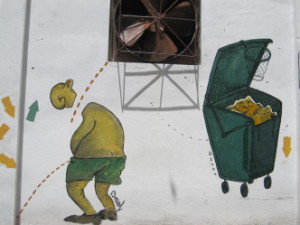When Fidel Castro seized political power in Cuba, one of the first measures he adopted in order to maintain power was to suppress the freedom of expression, regulated by the Declaration of Human Rights since 1948.

The first step towards these measures was made by him in the José Martí National Library in Havana in 16 July 1961 where three meetings with a group of Cuban writers were held. In one of the meetings behind closed doors his famous phrase hanging over the heads of intellectuals like the sword of Damocles originated. “Inside the Revolution, everything; outside, nothing.”
The famous playwright and poet Virgilio Piñera – a dissident constantly monitored by the state secret police agents – found the courage and expressed his fears of such words in front of the Commander-in-Chief. He didn’t fear the Commander but the tragedy he could see approaching his fellow writers. He is sure to have also asked how the writers were supposed to write if the a motive for writing was the man’s heart.
During those days, we could, for the first time, observe – what a coincidence, threat or premonition – Soviet MiG fighter jets flying across our sky symbolizing guards of another procommunist dictatorship on a free continent.
It was obvious that the new leader feared the liberty of expression that could be used by intellectuals. After many years in opposition, he knew very well what an important role the media play in “perfecting” the society.
The price paid by Cuba has been extremely high. The country has lost many of its intellectuals – perhaps the most valuable ones – something that the history will record as yet another crime of the dictatorship. Killing intellectuals, condemning them to prison or making them flee or die is nothing but a crime.
The tragedy suffered by our intellectuals starts with those who went through the Castro’s prisons, continues with those who were forced to emigrate and ends with those who remain silent.
All of them, without any exceptions, are the victims of a system where no freedom of expression exists, where we live at the mercy of a single valid voice, where we are deprived of the freedom of assembly and association.
Here are the names of many of those that shall be remembered:
Writers condemened to Castro’s prisons: Jorge Vals, Angel Cuadra, Heberto Padilla, Lina de Feria, Manolo Ballagas, Reinaldo Arenas, Teo Espinoza, René Ariza, José Antonio Zarraluqe, Fernando Velázquez, Reinaldo Bragado, María E. Cruz Varela, Tania Díaz Castro, Raúl Rivero, Manuel Vázquez Portal, Angel Santiesteban and others.
The most famous writers that fled into exile: Jorge Mañach, Lidia Cabrera, Guillermo Cabrera Infante, Enrique Labrador Ruiz, Gastón Baquero, Heberto Padilla, Belkis Cusa Malé, Manuel Díaz Martínez, Carlos Alberto Montaner, Reinaldo Arenas, Eliseo Alberto, José Lorenzo Fuentes, Jesús Díaz, Norberto Fuentes.
Silenced or isolated writers: Francisco Riverón Hernández, Agustín Acosta, José Yánez, Alberto Rocasolano, Rafael Alcides Pérez, Héctor Zumbado and many others.
Young poets dispossessed in exile: Eduardo Lolo, Francisco Mesa Rollé, Gladys Zaldívar, José Mario and others.
A writer shot to death in 1971: Nelson Rodríguez, 33 years old, the author of El Regalo (A Gift), published by Ediciones R in 1964, and of many other so far unpublished works.

Leave a comment